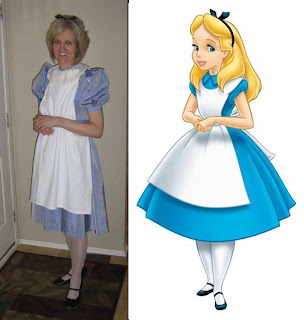“Do
you think I’ve gone round the bend?”
“I’m
afraid so. You’re mad, bonkers, completely off your head. But I’ll tell you a
secret. All the best people are.” (from Lewis Carroll’s Alice in Wonderland)
I’ve
hung out with theatrical types for more than twenty years, and I’ve discovered
a few ways they are, shall we say, the “best people.” Throw a group of theatre
people together and it’s an instant party. They provide their own entertainment
and are their own biggest fans. Unlike normal people, theatre people get up and
dance as soon as the band starts to play. There’s no need to wait for alcohol
to lower inhibitions because they were born uninhibited. This suits me well, as
I hate to drink but love to dance.
When
you assemble several theatre groups from across the province, you ignite something
fantastic. It’s called the ACT Festival (Association of Community Theatre) and
it happens every year about this time. This year, its 35th, our own
Prairie Players will host it at the William Glesby Centre. The overall theme
for the weekend is “Through the Looking Glass,” so if you notice conferees running
around town dressed as characters from Alice in Wonderland, you’ll know why.
That’s another thing about theatre people. When called upon on to wear a
costume, they participate. Personally, I found the perfect Alice dress at the
Portage MCC for a steal of a deal.
 | |
| Photo taken before I got the crinoline. It's as poofy as Alice's now! |
Opportunities
abound for you to participate as well. If you enjoy live theatre, here’s your
chance to see up to eight plays.
Friday
evening, April 26 at 8:00, our local troupe will kick things off by presenting
a short sketch written by Jean Burch called The Burglar. Narrated by Barb
Burch, it features Keith Burch and Vicki Hooke as the burglar and the old maid,
respectively.
Saturday
morning will start at 9:00 with The Good Doctor presented by Broken Records
Productions of Winnipeg. At 10:30, The Pinawa Players will present Half Life.
The afternoon line-up includes Act 2 from A Month of Sundays, starting at
1:30 and performed by Tumbleweed Productions of Virden. At 3:00, Shoestring Productions of Winnipeg
will present scenes from Quilters, followed at 4:15 by the Phoenix Players,
also from Virden, bringing us Just Around the Bend.
Between
plays, three theatre professionals offer their critiques and I always enjoy the
challenge of predicting what suggestions they might make. Groups can also take
advantage of the opportunity to workshop their play with one of the three pro’s.
It’s a great time of learning together and then celebrating at the dinner and
dance on Saturday evening.
Sunday
morning kicks off again at 9:00 with two plays presented by Flatland Theatre
Company of Winkler: Not My Cup of Tea and A Human Write. The Vagabond
Theatre Company of Binscarth will wrap things up at 10:30 with an excerpt from The
Cemetery Club. At least seven other groups will attend, from places like
Holland, Swan River, Thompson, Gimli, Dauphin, and Neepawa.
If
you’d like to see the Friday evening performance only, tickets cost $5 at the
door. You can attend Saturday morning or afternoon for $10, or all day for $15.
Sunday morning also costs $10.
“But I don’t want to go among mad people,” Alice
remarked.
“Oh,
you can’t help that,” said the Cat: “we’re all mad here. I’m mad. You’re mad.”
“How
do you know I’m mad?” said Alice.
I
hope you can join us for a little bit of madness and whole lot of fun this
weekend.


